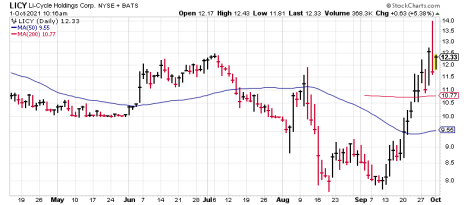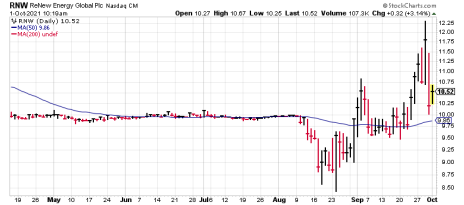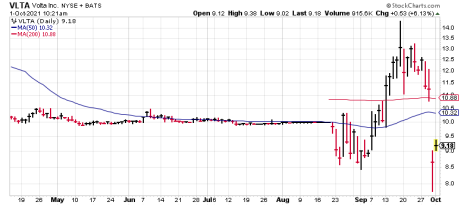One of the most exciting aspects of investing in Greentech is the number of companies that have come to market in the past 18 months. Greentech busted out of a decade-long trading range in early 2020 and into the start of a multi-decade bull market. A lot of the innovative companies venture capitalists funded during the 2010s have been drawn into the stock market. A bunch of these stocks went public by special purpose acquisition companies (SPACs).
Businesses public by SPAC are now out of favor with traders, but that’s a good thing for an investor working with a longer horizon – there are some potentially huge winners that have been subject to what I call the market’s “SPAC discount.” I have three clean energy SPACs to tell you about, but first a bit about what I mean by SPAC discount.
When a SPAC raises money at its IPO to go find a business to buy, its main shareholders are hedge funds. They cash out when the SPAC announces they’ve struck a merger deal. At that point, though, the SPAC has other buyers in a PIPE syndicate – the private equity in public financing that partially funds mergers. But, likewise, PIPE investors want to get their money out when the merger closes.
[text_ad]
That means by the time a SPAC merges with its target, it has cycled through two sets of traders and now has to find a THIRD set of buyers to support prices. That’s hard: news and enthusiasm around the deal has petered out and it’s harder for investors to commit to the long-term when they’ve already seen the ugly charts from all that institutional arbitrage. So you get good businesses pricing the same as bad ones, and they’re all being treated with the same indifference right now.
Plus, there are a lot of newly public businesses trying to catch people’s attention. According to data from SPAC Alpha, there are 132 closed mergers with a further 130 SPACs that are in the process of closing their combinations right now. How does a stock stand out? Some companies do it with eye-catching ideas: Vacuuming rare earth metals from the sea floor and storing energy on construction cranes are two of the more unique plans I’ve seen in the Greentech space.
But not every fun idea makes a business, or a good stock to buy. To find the gems, I sifted through the dozens of Greentech SPACs. I had two initial criteria: have a merger deal in place and an actual product on the market, even if volume was small. That eliminated a lot of speculative efforts. What I ended up with were a basket of six Greentech SPACs that I bought.
I wanted to point out three of these clean energy SPACs today, all of which recently closed their mergers, because I believe they have the qualities growth investors want: a good idea being executed well right now with tremendous potential for profits in the market.
Clean Energy SPAC #1: Li-Cycle Holdings (LICY)
Market cap $2 billion
By the end of the decade, 90% of lithium demand will be for batteries. That will raise the price of the commodity and put a strain on supplies. Li-Cycle recycles li-ion batteries through a closed-loop process that generates no waste and involves no combustion, cleanly producing lithium and other battery components ready for resale. Its plants in New York and Ontario can process 10,000 metric tons a year right now. Two more facilities, in Arizona and Alabama, will open in 2022, doubling capacity. The company has a fairly simple plant model that allows for quick expansion, too. In addition to traditional recycling sources, Li-Cycle has deals to collect scrap from numerous battery makers who discard as much as 30% of lithium in manufacturing. Scrap lithium volumes that will quintuple by 2025, the company says. Further down the line: massive volumes from end-of-life recycling from EVs. Sales hit $1.7 million in its latest quarter and will be up 50% to 100% this quarter as the business ramps up to full utilization of capacity. Li-cycle closed its SPAC merger in early August and white shoe Wall Street analysts have just noticed the business. They’re saying shares can rise 40% to 50%.
Clean Energy SPAC #2: ReNew Energy (RNW)
Market cap $4.18 billion
ReNew is India’s largest renewable electricity company, with 5.9 gigawatts (GW) of capacity and another 5.6 GW committed (in developed and/or with signed awards), split roughly evenly between wind and solar. It just bought 99MW of hydropower in India, its first foray into water. Renewable energy on a utility scale costs less than traditional fossil fuel power in India without any subsidies, meaning renewable power demand is expected to meet all of India’s electricity growth. The country will triple its electrical demand in the next decade, which in effect means renewables will grow 10-fold from today. Overall, ReNew will generate $699 million in revenue this year, has $905 million in committed sales for 2022 and $1.1 billion the year after that. EBITDA margins are huge at 83% (yes, 83%) and seen edging higher in coming years. Goldman Sachs owns 32% of the company with the Canada Pension Plan Board owning 13% as the second-largest shareholder. The SPAC merger completed in mid-August.
Clean Energy SPAC #3: Volta (VLTA)
Market cap $1.5 billion
Volta operates EV charging stations. In 2020, it generated $25 million in sales from 1,507 locations in the U.S. and says it will make $47 million this year from about twice that. Volta’s business model is to combine display advertising with charging: basically putting ads on charger displays about the size of ads you see on mall directories. The company likes to put chargers at or near retailers where ads can generate immediate spending. Part of its thesis is that food retailers in particular will want Volta charging stations on their property and food brands will want to advertise on them. Why? Because gas stations actually really make their profits from food purchases. With no need for gas, that spending becomes up-for-grabs. In the long term, Volta says it can apply artificial intelligence to station and ad data to drive further advances, including information and planning services it can sell.
We purchased the warrants of these three. Warrants are cheaper than shares and offer a better chance for multi-bagger-style gains. But SPAC warrants come with caveats around mandatory redemptions and expiration dates, plus trading tends to be very volatile. Buying shares of these outright can be a less volatile while offering a lot of long-term upside for aggressive growth investors.
Do you own any SPACs? Tell us about them in the comments below.
[author_ad]



